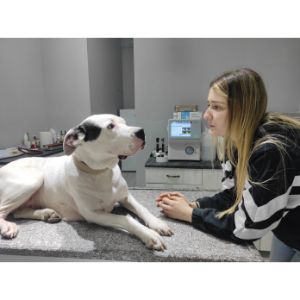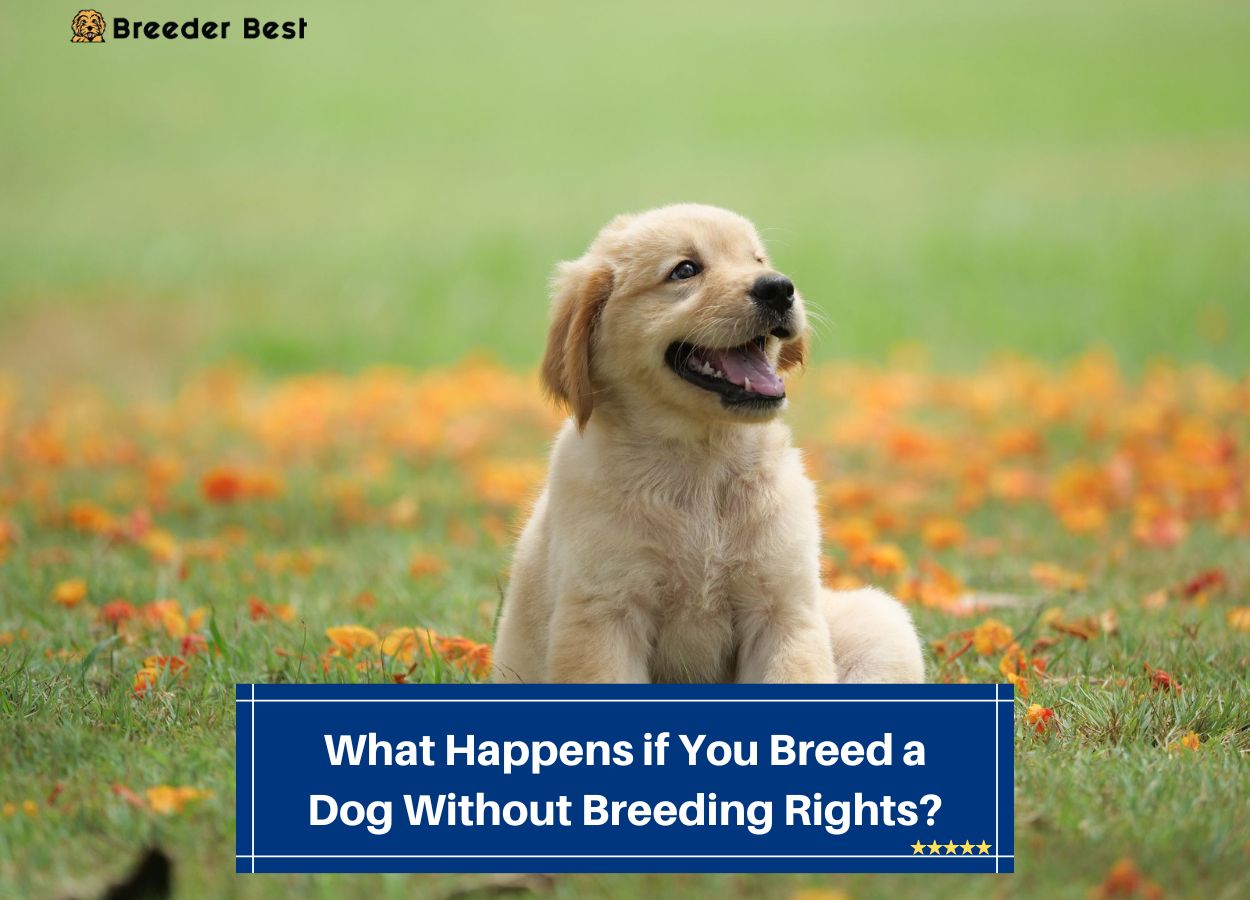If you’re like most of us, you’ve looked at your adorable dog and thought it would be great to have more of these. There is more to dog breeding than what naturally occurs when you get a mommy dog and a daddy dog together. This also begs the question, what happens if you breed a dog without breeding rights?
Other articles you would like: Why Can’t a Human Breed With Other Animals? and The Best Animal Breeding Associations
What Are Animal Breeding Rights for Dogs?

Breeding rights are a vital tool in dog breeding. Breeders use, bestow, and limit these rights to protect the development of the bloodline when selling puppies to third parties.
A litter of puppies born to a breeder without breeding rights will not be allowed to register with the American Kennel Club (AKC) and some alternative clubs. The AKC allows for two types of registration.
Full registration gives the puppy’s new owner the right to breed that dog and register the subsequent puppies. This type of registration costs more than limited registration.
Limited registration means that you can get AKC papers for your puppy, but you cannot breed the purchased puppy.
Why Do Breeders Limit Breeding Rights to Third Parties?

You may wonder why you need animal breeding rights for dogs. Dog breeding is an art and science meant to yield the best specimens in a particular breed.
Some dog breeders work over generations of dogs to select the best candidates to build a bloodline that results in the strongest, healthiest, most beautiful members of their breed. As those puppies grow and breed to the next generation, they represent the original breeder and their hard work.
Most breeders consider it an ethical duty to stop certain genetic defects and congenital diseases from carrying forward into future generations of dogs. Selective breeding benefits the animals and future owners. Responsible breeders assure that only the very best of the breed carry their genes forward.
Limiting breeding rights for certain puppies helps strengthen the breed and the bloodline as a whole. Breeders also understand that limiting breeding rights means that they must significantly reduce the price of those puppies. The new owner will not be able to reap any financial benefit from breeding that dog in the future.
On the flip side, a puppy who is the epitome of excellent breeding choices is worth the top dollar.
Full Breeding Rights

When your puppy comes with full breeding rights you can be confident that it is free from congenital defects. You can enter that dog into shows or competitions and register any puppies (granted that the other parent also carries full breeding rights).
If you choose to breed a dog who carries full breeding rights, you enter into the work of building a durable and healthy bloodline. It behooves the new breeder to maintain that line by selecting a healthy mate, screening the puppies for defects, and possibly limiting registration on some members of future litters.
Paperwork

If you are reading this article, you are probably wondering, can I breed my dog without breeding rights? First, let’s look at what paperwork may be involved when you buy a purebred dog from an experienced breeder.
- Certificate of Ownership
- Health Certification
- Health Records
- Pedigree
- Breeder Contract
A certificate of ownership proves the breeder is the legal owner. You then register the dog in your name.
Health certification involves genetic testing, phenotypic evaluations, and other tests for congenital problems. Typically, breeders let you know up front what tests they provide. The cost of testing is one reason purebred dogs sell for more than puppies from a backyard breeder.
Two organizations that supervise the health certification process are The Canine Health Information Center (CHIC) and the Orthopedic Foundation for Animals (OFA).
The health record shows the dog’s vet visits, medical procedures (if any), and vaccinations.
The Pedigree authenticates your dog as a pure breed by showing its lineage through three generations. It’s your dog’s family tree.
A breeder contract may include any number of clauses that bind you to certain obligations. Many breeders include a spay or neuter clause for pet quality dogs. Another possibility is a return-to-breeder clause. If for any reason, you must rehome your dog, the breeder wants notification about the change in ownership.
Be sure you understand everything in a breeder contract before signing.
Pet vs. Breeding Rights

Breeders distinguish between pet-quality puppies and puppies with show quality potential.
Pet Quality Puppies
When a breeder considers a puppy will not become a showing or breeding candidate, they will sell it with limited registration. That puppy can participate in AKC events except for dog shows and any puppies of theirs cannot be registered.
While there is no category of pet breeding rights, some contracts may require you to spay or neuter a dog sold with limited registration. The AKC’s position on spaying and neutering is that “these important decisions should be made on an individual basis.”
Various opinions exist among vets and breeders about when is the best time to spay or neuter dogs. As more research accumulates on the matter, waiting for these procedures until a dog reaches maturity seems to be the best course.
Once you own the dog, you would be responsible to fulfill your contractual obligation to spay or neuter. Breeders are not looking for a legal “gotcha” when they include this clause in a contract. Most of them feel passionate about ethical breeding practices and the health and well-being of the puppies they bring into the world.
Potential Show Quality Puppies
A breeder may determine that a puppy has the potential to grow into an excellent specimen. In this case, they will sell the puppy with full breeding rights. However, a contract may have several more stipulations including seeing the puppy at a certain age, showing the puppy themselves, or hiring a professional handler for shows.
Breeding may carry more contractual obligations for puppy health screenings, responsibilities for whelping and placing future puppies, when breeding happens, financial arrangements, etc.
Co-Ownership

One option for new breeders who need a mentor while getting into breeding is co-ownership.
How to Co-Own a Breeding Dog
The best practice is to sign a highly-detailed contract for every aspect of raising and breeding a co-owned dog. How costs and responsibilities are split between the owners depends on the individual arrangements made by the parties involved.
Like any contract, be sure you understand every clause clearly before signing. If you are uncomfortable with one or more aspects demanded by the breeder, consider finding another partner.
Many breeders desire co-ownership over their best show dogs. These animals represent them as breeders, making it a wise investment to stay involved in the dog’s show career.
Breeding Without Breeding Rights

In some cases, you can purchase a puppy under limited registration but won’t be contractually obligated to spay or neuter that dog. You would be breeding without breeding rights, sometimes called breeding without papers.
Breeding a dog who has limited registration carries some consequences. While your dog technically “has papers” because it is registered with the AKC, the puppies are not eligible for registration or to participate in any AKC shows.
The AKC began the limited registration option because it found that breeders were withholding registration papers when a puppy went to a non-breeding home. Sometimes the new owners bred the dogs anyway. When they tried to register the puppies, they found that their dog remained under the original breeder’s name.
This may lead you to wonder what happens if I breed my dog without breeding rights? You cannot register the puppies with the AKC. However, there are other registries where you can register them.
As long as your breeder contract does not have a spay/neuter clause, you are free to breed your dog. As limited registration has risen among AKC breeders, the practice of using alternative clubs has risen in popularity.
If you did sign a contract with a spay/neuter clause, the breeder could sue to reclaim the animal. It depends on the terms of the contract, but it is enforceable in court.
Frequently Asked Questions
Why Do Breeders Charge For Breeding Rights?
Breeders charge for breeding rights because those pups are of higher quality. Moreover, these pups are generally screened, vetted, and taken out of the litter for their exemplary qualities which nets them a higher price.
What Happens If You Break A Breeder Contract?
A breeder can exercise the legal right to reclaim their dog and you might not be able to join the kennel club of your choice. Depending on the nature of the contract, legal action may be taken against you as well.
What Does Limited Breeding Rights Mean?
Limited Breeding Rights means that your dog itself is registered and allowed to participate in shows. However, any of its offspring cannot be registered under any circumstance.
Conclusion For What Happens if You Breed a Dog Without Breeding Rights?

So, can you breed without breeding rights? Yes. You should carefully consider whether to breed your dog when you don’t have breeding rights from the original breeder.
Limiting breeding is a tool that protects healthy bloodlines to produce puppies who do not carry genetic abnormalities or diseases.
You may have a contractual obligation to spay or neuter your dog. Not fulfilling that obligation is risky. If you are not comfortable signing a contract with a spay/neuter clause, consider finding a puppy from a breeder willing to provide full registration or at least not require fixing your dog.
What happens if you breed a dog without breeding rights? You’re not likely to face legal action except in certain circumstances. The puppies will not be eligible for registration with the AKC and some other clubs. There are alternative registries for limited dogs.
You will also like:
- Maltipoo Breeders in Illinois
- Ferret Breeders in the United States
- Cavalier King Charles Breeders in California
For more information about Dog Breeding, check out the video below:

